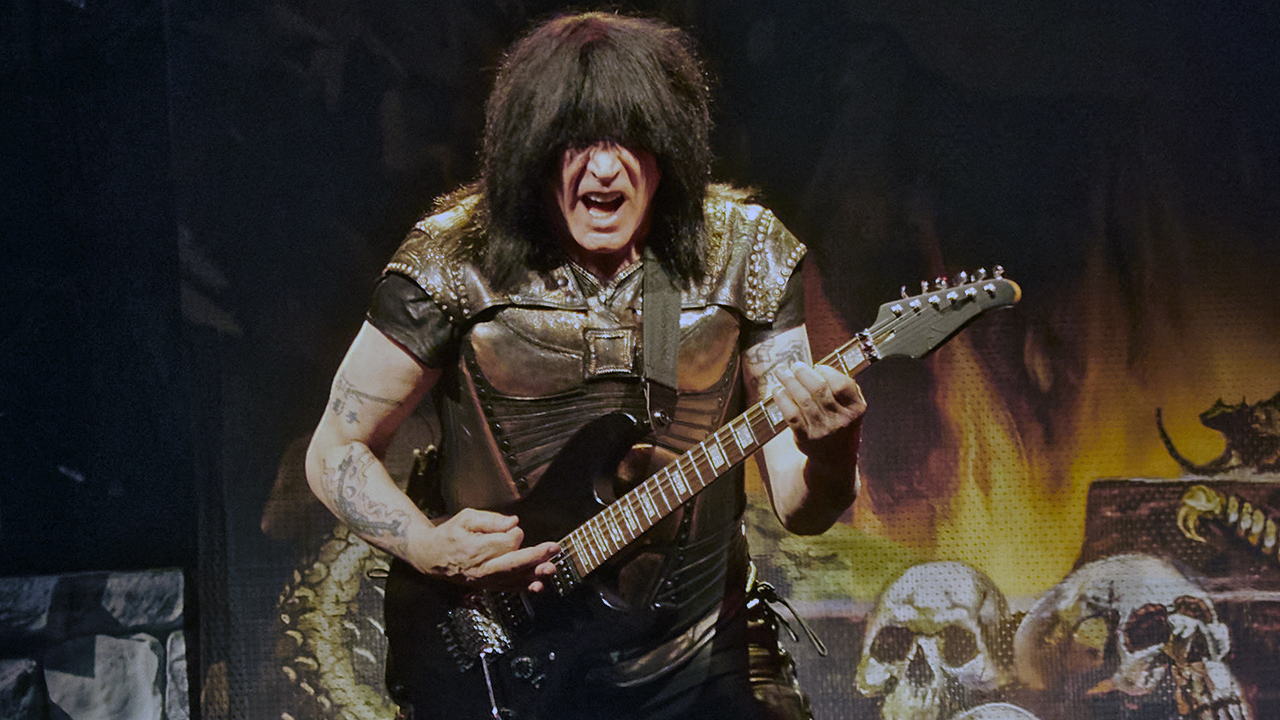Jimmie Vaughan Discusses His New Album, 'Plays More Blues, Ballads & Favorites'
All the latest guitar news, interviews, lessons, reviews, deals and more, direct to your inbox!
You are now subscribed
Your newsletter sign-up was successful
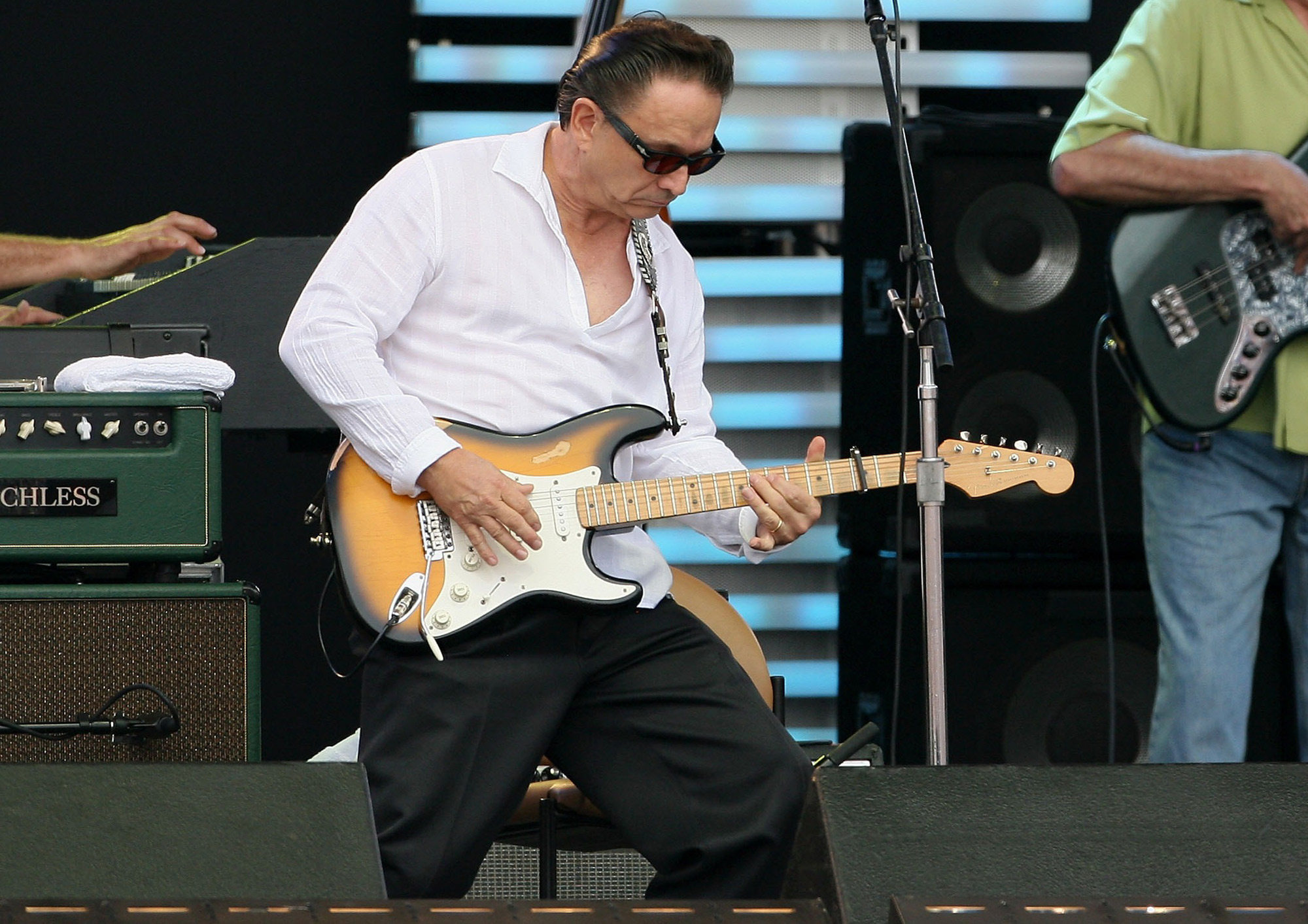
Since releasing his first solo album in 1994, Texas blues-rock legend Jimmie Vaughan, founder of the Fabulous Thunderbirds and older brother of the late Stevie Ray Vaughan, has worked at what can be called a relaxed pace, releasing four solo albums in 16 years.
So it's a welcome surprise that only 12 months after his last album, 2010's Grammy-nominated Plays Blues, Ballads & Favorites, Vaughan is set to release the aptly titled Plays More Blues, Ballads & Favorites, a second helping of covers of the roots music that inspired him.
The album, which features covers of songs by Ray Charles, Hank Williams Sr., Lloyd Price, Jimmy Reed and others, was recorded at the vintage-geared Top Hat Recording in Austin. Singer Lou Ann Barton joins Vaughan once again, as does his new-and-improved band consisting of Ronnie James (standup bass), Billy Pitman (rhythm guitar), Greg Piccolo (tenor sax), Doug James (baritone sax) and George Rains (drums).
"I just got on a trip and couldn’t stop," Vaughan said. "I thought it would be great to have the bookends. And if you liked the last one, you're going to love this one."
Guitar World spoke to Vaughan while he was at home in Austin, taking a breather between two performance-packed weeks. We discussed the new album, some very old albums and his two signature model guitars.

Only one year separates your last album, Plays Blues, Ballads & Favorites, and your new one, Plays More Blues, Ballads & Favorites. Is the new album the result of new recording sessions, the same sessions or a combination of the two?
Mostly it was new. What happened was, when I made the last one, I just never stopped. I thought, "Well, this is so much fun." And these songs are really great to play on the gig. People love them and they swing, and it's just great music, so I just kept going, finding more and more songs.
All the latest guitar news, interviews, lessons, reviews, deals and more, direct to your inbox!
How do you choose the material?
I just pretend I'm making singles, so it's not hard to come up with two or three songs. It's really tough to come up with 10 or 15. But if you just have to come up with two or three at a time, well, there's just so much good stuff out there that you can take and kind of bend to fit your needs.
Earlier, you said live audiences are really loving these songs, and I have to agree. I saw you in May 2010 in New Jersey and—not that I've ever seen a bad Jimmie Vaughan show—but this new band, the new show in general, really seems to be a step up. Do you feel a difference?
I don't want to sound too confident or anything, but I've always had good bands; I can count on one hand the times it could've been a lot better. But this band—playing with Greg, Doug James and Ronnie James—I just love it. They're really fun. We get up on stage, and it takes off like a glider. And music-wise, it's sort of a dream come true. It's the stuff I heard back when I first really got into blues and started digging it. It's sort of bizarre that it has come all away around. Nobody has a better job than I do.
I know—I'm jealous. There's an instrumental called "Greenbacks" on the new album, and it has a very vintage-sounding reverb that cuts in and out, like something you'd hear on a Johnny "Guitar" Watson record. Exactly what kind of reverb is that?
It's just plate [echo]. A lot guys would just turn it on in the middle of the song to emphasize a point. Johnny "Guitar" Watson did it, but a lot of other people did it too. They did it to sax players, and it was kind of like a new trick at the time. I did it a lot on the album, but it was a little more subtle in other places.
It's kind of what they did in the Fifties and even in the Forties, when they first started getting echo and things. It just drives a regular engineer up the wall. They can't believe it, because they all went to school and learned how to separate everything with no noise. And our records are rattling and distorting and buzzing and doing all the stuff you're not supposed to do, but it sounds cool.
So it's not a mistake, is what I'm trying to say. We don’t set out to make noise, but if something really has a good tone musically, and if it sounds cool, and it might have a little buzz on it or something, if we can get away with it, we will.
Did you stick with your signature model Tex-Mex Strat on this album?
Yeah. I went down and found one in a used shop in Austin, and I loved the neck. I fooled with it for a couple of days and I've been using it since last year. I have a combination of them, some old and new parts put together. I've got three or four, but they all have Jimmie Vaughan necks and pickups and stuff, because I've found that those really work. You can use them all different ways.
I should mention that I've had a Jimmie Vaughan Tex-Mex Strat since 1998.
Do you like the bridge pickup?
Yes. I use the bridge and neck pickups, mostly.
I'll tell you a secret: Find another bridge pickup, and put it in the middle. Try it [laughs]. It does something. I can't explain it, but it's cool.
Thanks! The only change I've made to mine is I've added the little "Original Contour Body" logo to the headstock.
Oh, yeah. They're like '32 Fords or something, you know? You can do whatever you want. That's what we used to do to those guitars, the regular Strats we had. We would put a tone knob on the bridge pickup so you can back off a little bit and get kind of a Telecaster sound. You didn't really have a lot of parts, so you would just kind of wind things together and try things, just like a hot rod.
Do you still use Matchless amps?
I played Matchless for several years. When I was in L.A., they let me go to the factory when they first came out, and I got two or three of them and I enjoyed them. But then I discovered those Bassman re-issues and started using those. Then I found different ways to fool with them. There's a guy in town named Grammatico, who is making hand-wired Bassmans. Even the Matchless sounded like an old Fender, except clean. I'd use any kind of amp if it sounds good.
I recently visited a serious Gretsch dealer in Brooklyn and spotted—for the first time—a Gretsch G400JV Jimmie Vaughan Synchromatic [See the photo gallery below]. No one ever talks about that guitar. What's up with that model?
Yeah! I don't think people could really understand why I would want something like that and why I did it. There's a guy here in Austin who plays for one of the studios—any kind of acoustic, like on Western swing, how they play the all the chord changes, the rhythm. They work great for that. Kind of like a gypsy kind of sound. They have a really good sound because they have a Fishman pickup. It's not like the synthesized acoustic pickup, which is kind of tinny.
I called them up to ask if they still made those Synchromatics, and they said, "Yeah." And I said, "Well, I want to order a couple." And they said, "Well, would you like to have a signature model?" And I was like, "Really? Yeah." They said, "What would you do with it?" And I said, "Well, I would make it electric with a pickup, like a Fishman," because I had a Regal guitar that had a Fishman pickup on it, which I used on "Six Strings Down" on my first solo album, Strange Pleasure. Sometimes I use the Synchromatic for rhythm on my records.
When you record, do you use any effects between guitar and amp?
No, I'm just plugged into the amp. I really like the way that sounds. I love the way the Strat sounds in all different situations, like you can just put it on a different pickup, different combination, different volume. It's endless. I can't get the same sound even if I want to, if you know what I mean.
You can record with the same amp, same guitar, come back the next day and it sounds different to me. I mean it's similar, but all the different variations are endless. I love that. I like tremolo once and a while, maybe, and plate echo, like I said.
Do you track your solos live? I notice there are some little imperfections, but I wonder if you leave them in as if to say, "That's what I just played, and that's how it sounded. The end." No punching and fixing.
Well, I make mistakes, but it depends. If there's something else in there that's cool or, you know, a lot of times you do stuff you didn't mean to do and you couldn't have thought of that; you couldn't have come up with that on your own. It's just an exciting trip, you know? Like you fall down and you get back up and something happens. Those are the kind of things I like in the records.
The answer is yes, I do that. I don't do it on purpose, but if the good outweighs the bad, I'll just leave it in there.
I've always wanted to tell you that I've been stealing one of your solos for years—it's your solo on "The Crawl" from the What's the Word? album by the Fabulous Thunderbirds. I steal that from you about once a week.
Well, good. I can't remember, but I think I stole that from Guitar Junior. So don't feel bad!
And speaking of your Fabulous Thunderbirds days, how did you get that unusually thick yet biting sound on "Wait on Time" from Girls Go Wild?
That whole album was done on a new Telecaster, so a Seventies Telecaster and a Super Reverb amp. You know, it might've been a Strat, because I had my old Strat and I had a Telecaster and I can't remember which one. But I had the Telecaster for quite a while, and it would do everything that the Strat would do at the time. That treble pickup is terrific. If you get the right strings on there and you get it set right, it'll do a lot of things. I probably did more than half of my stuff on a Strat with the bridge pickup. All that rhythm and stuff, like "Sugar Coated Love" and all that. That's a bridge pickup on a Strat.
You recently recorded two albums with Omar Kent Dykes, including 2007's On the Jimmy Reed Highway. I know Kim Wilson [the Fabulous Thunderbirds] plays blues harp on that album, and you and he are on a few songs together, which comes pretty close to a Thunderbirds reunion. What is your relationship with Kim like, and do you ever discuss making an album together?
Well, I think we might, it's just that I'm just doing my thing and he's doing his thing, so I don't know where we would meet. I don't think it's high on either one of our lists [laughs]. But yeah, it would be fun to make a record and do a little tour together.
You own—and show—several vintage cars. Do ever work on them personally?
I do sometimes, but I'm not a great mechanic. I know just enough to get me out of trouble, you know.
Plays More Blues, Ballads & Favorites comes out July 26 via Shout! Factory Records. For more information, visit JimmieVaughan.com or ShoutFactoryStore.com.
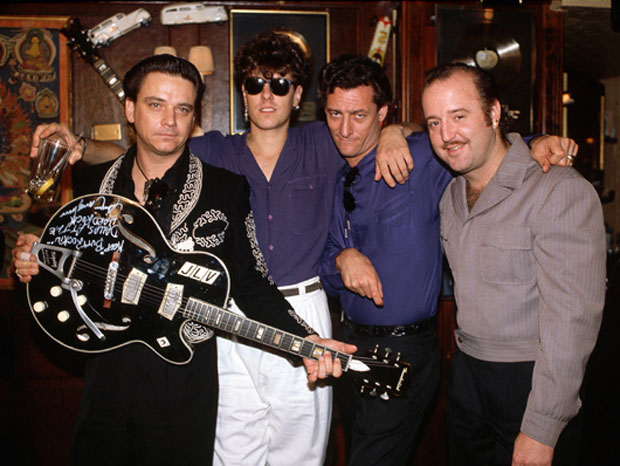
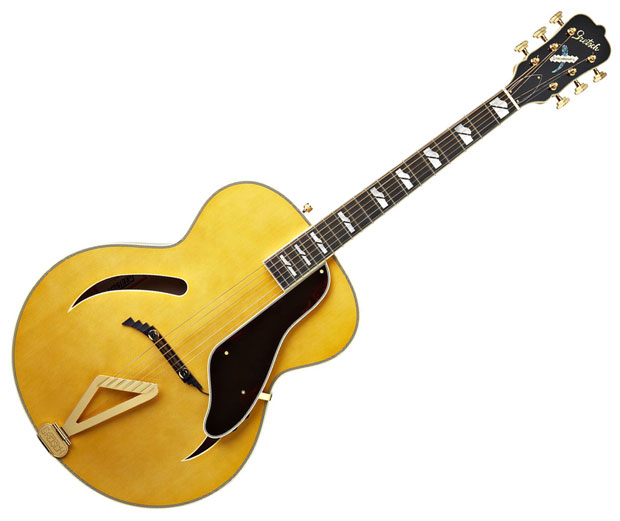
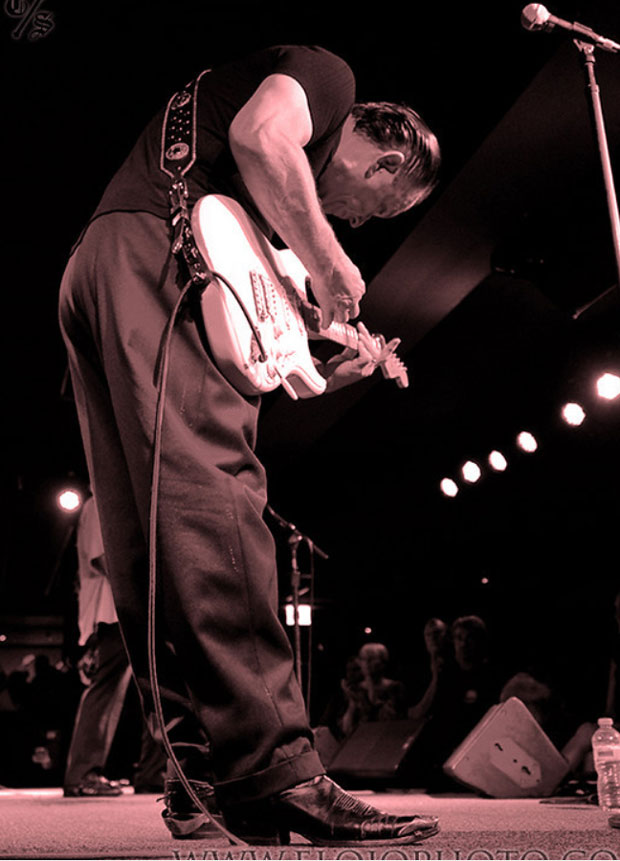
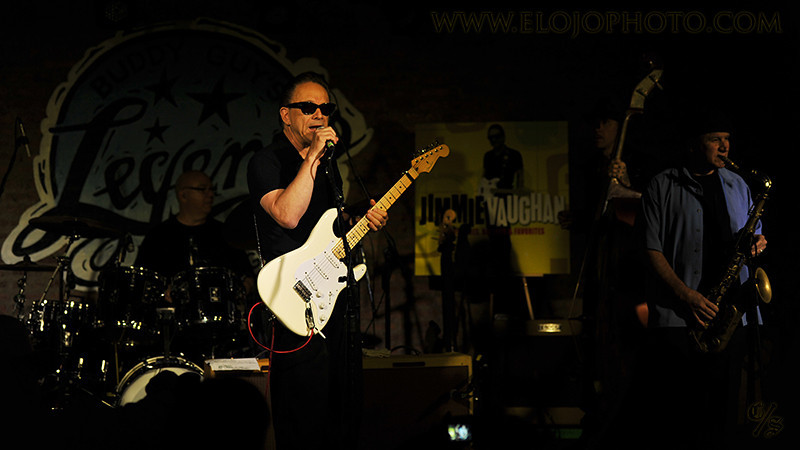
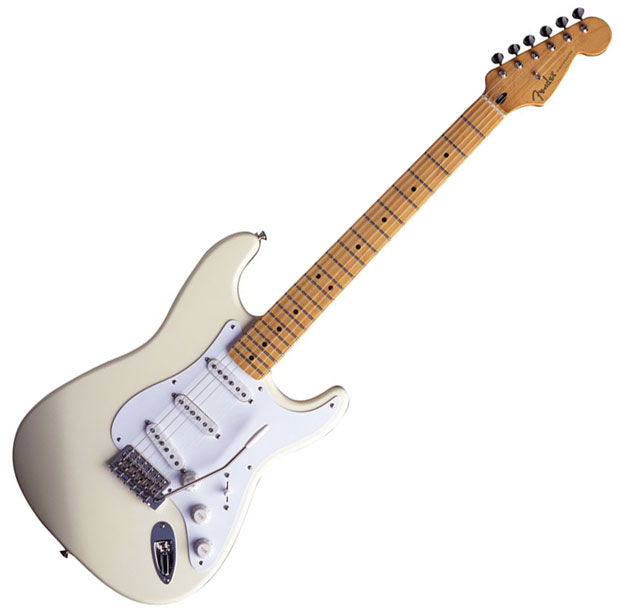

Damian is Editor-in-Chief of Guitar World magazine. In past lives, he was GW’s managing editor and online managing editor. He's written liner notes for major-label releases, including Stevie Ray Vaughan's 'The Complete Epic Recordings Collection' (Sony Legacy) and has interviewed everyone from Yngwie Malmsteen to Kevin Bacon (with a few memorable Eric Clapton chats thrown into the mix). Damian, a former member of Brooklyn's The Gas House Gorillas, was the sole guitarist in Mister Neutron, a trio that toured the U.S. and released three albums. He now plays in two NYC-area bands.
